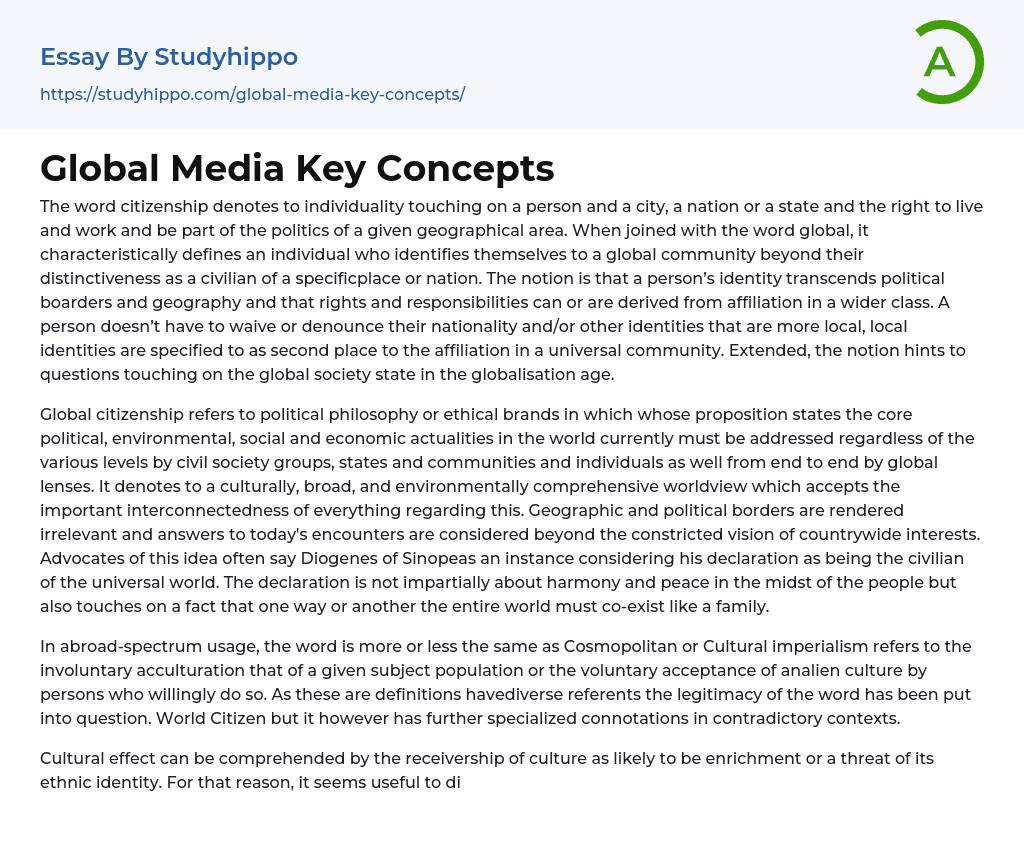The word citizenship denotes to individuality touching on a person and a city, a nation or a state and the right to live and work and be part of the politics of a given geographical area. When joined with the word global, it characteristically defines an individual who identifies themselves to a global community beyond their distinctiveness as a civilian of a specificplace or nation. The notion is that a person’s identity transcends political boarders and geography and that rights and responsibilities can or are derived from affiliation in a wider class. A person doesn’t have to waive or denounce their nationality and/or other identities that are more local, local identities are specified to as second place to the affiliation in a universal community. Extended, the notion hints to questions touching on the global society state in the globalisation age.
Global citizenship refers
...to political philosophy or ethical brands in which whose proposition states the core political, environmental, social and economic actualities in the world currently must be addressed regardless of the various levels by civil society groups, states and communities and individuals as well from end to end by global lenses. It denotes to a culturally, broad, and environmentally comprehensive worldview which accepts the important interconnectedness of everything regarding this. Geographic and political borders are rendered irrelevant and answers to today's encounters are considered beyond the constricted vision of countrywide interests. Advocates of this idea often say Diogenes of Sinopeas an instance considering his declaration as being the civilian of the universal world. The declaration is not impartially about harmony and peace in the midst of the people but also touches on a fact that
one way or another the entire world must co-exist like a family.
In abroad-spectrum usage, the word is more or less the same as Cosmopolitan or Cultural imperialism refers to the involuntary acculturation that of a given subject population or the voluntary acceptance of analien culture by persons who willingly do so. As these are definitions havediverse referents the legitimacy of the word has been put into question. World Citizen but it however has further specialized connotations in contradictory contexts.
Cultural effect can be comprehended by the receivership of culture as likely to be enrichment or a threat of its ethnic identity. For that reason, it seems useful to differentiate cultural imperialism as being boldness of superiority, the stand of a group or culture which seeks to supplement its cultural creation, considered to be partly poor compared to products that are imported. The imported services or products can represent themselves or can be linked with some values like consumerism. According to a certain argument, the culture that is receiving does not automatically perceive this connection but instead engrosses the alien culture inertly using the foreign services and goods. Owing to its rather hidden but very strong nature, this theoretical idea is labelled by some specialists as banal domination.
For instance, it is claimed that despite the factAmerican companies are reproached of yearning to take control of up to 95 percent consumers in the world. Cultural imperialism encompasses more than meek consumer goods and services, it also encompassed the American dissemination principles like democracy and freedom a process that might sound attractive but that masks a terrifying truth. Many cultures all over the world are vanishing owing to the
vast influence of cultural and corporate America. However some are certain that the freshly globalised economy of late 20th and the early 21st century has eased the process by using first-hand information technology. This type of cultural imperialism comes from what initially referred to as soft power. The notion of automated colonialism prolongs the subject to world-wide cultural concerns and the effect of key multi-media multinationals.




